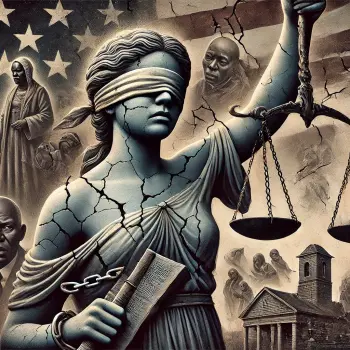 The 2024 presidential election presents a critical juncture for America, as it faces numerous social, economic, and political challenges that will reshape it – for better or worse. Now that Kamala Harris is the presumptive Democratic candidate, she needs to share and articulate a vision that embraces diversity, equality, and justice – making her a compelling choice for a broad spectrum of voters, including Christians, atheists, and people of other faiths or philosophies. In contrast, Donald Trump’s track record and policy positions have often been divisive and counterproductive. Additionally, understanding the implications of third-party votes is essential in ensuring that the election’s outcome aligns with the broader goals of inclusivity and progress.
The 2024 presidential election presents a critical juncture for America, as it faces numerous social, economic, and political challenges that will reshape it – for better or worse. Now that Kamala Harris is the presumptive Democratic candidate, she needs to share and articulate a vision that embraces diversity, equality, and justice – making her a compelling choice for a broad spectrum of voters, including Christians, atheists, and people of other faiths or philosophies. In contrast, Donald Trump’s track record and policy positions have often been divisive and counterproductive. Additionally, understanding the implications of third-party votes is essential in ensuring that the election’s outcome aligns with the broader goals of inclusivity and progress.
Kamala Harris: A Candidate for All
Kamala Harris’s background and policy positions make her a candidate who can appeal to a wide range of voters. Her career has been marked by a commitment to justice, equity, and the well-being of all Americans, reflecting values that resonate across different belief systems.
For Christians: A Commitment to Justice and Compassion
Kamala Harris’s policies reflect a commitment to justice and compassion, core tenets of the Christian faith. Throughout her career, Harris has worked to address systemic injustices, advocate for the marginalized, and promote policies that support the common good.
Criminal Justice Reform
As a former Attorney General of California, Harris has a strong record of advocating for criminal justice reform. She has worked to end mass incarceration, eliminate cash bail, and promote fair sentencing practices. These efforts align with the Christian call to seek justice and show mercy, as articulated in Micah 6:8.
Healthcare Access
Harris supports expanding access to affordable healthcare, a policy that resonates with the Christian imperative to care for the sick. Her advocacy for comprehensive healthcare reforms reflects the belief that healthcare is a human right and that society has a moral obligation to ensure that everyone receives the care they need.
Environmental Stewardship
Harris’s commitment to environmental justice is another area where her policies align with Christian values. She has championed initiatives to address climate change and protect vulnerable communities from environmental harm, reflecting the Christian responsibility to be stewards of God’s creation.
For Atheists: Emphasis on Rational Policy and Human Rights
Atheists often prioritize policies based on rational, evidence-based approaches and the protection of human rights. Kamala Harris’s platform, which emphasizes justice, equality, and scientific integrity, aligns well with these values.
Science-Based Policy
Harris’s support for science-based policy, particularly in addressing climate change and public health issues, appeals to atheists who value rational decision-making. Her commitment to following scientific recommendations and investing in research and innovation demonstrates a respect for evidence and reason.
Human Rights and Equality
Harris has consistently advocated for the protection of human rights and equality for all individuals, regardless of their background. Her support for LGBTQ+ rights, gender equality, and racial justice reflects a commitment to creating a society where everyone is treated with dignity and respect.
For People of Other Faiths or Philosophies: Inclusivity and Respect for Diversity
Kamala Harris’s multicultural background and inclusive policy positions make her a candidate who respects and values diversity. Her approach to governance emphasizes the importance of representation and equality for people of all faiths and philosophies.
Interfaith Dialogue and Respect
Harris’s inclusive approach to faith and spirituality, influenced by her upbringing in a family with diverse religious traditions, underscores her respect for all belief systems. She has demonstrated a commitment to interfaith dialogue and the protection of religious freedoms, ensuring that all individuals can practice their faith without fear of discrimination.
Social Justice and Equity
Harris’s policies on social justice and equity resonate with many religious and philosophical traditions that emphasize the importance of caring for the marginalized and promoting fairness. Her focus on addressing systemic inequalities and ensuring equal opportunities for all aligns with the values of many faiths and philosophies.
Donald Trump: A Record of Division and Self-Interest
In contrast to Kamala Harris, Donald Trump’s presidency was marked by policies and rhetoric that often exacerbated division and prioritized self-interest over the common good. His record raises significant concerns for voters who value justice, equality, and truth.
Divisive Rhetoric and Policies
Trump’s rhetoric frequently targeted marginalized groups, including immigrants, religious minorities, and people of color, creating an atmosphere of fear and division. His policies, such as the Muslim travel ban and family separations at the border, have caused significant harm and contradicted the values of inclusion and compassion.
Economic Inequality
Trump’s economic policies, including tax cuts for the wealthy and corporations, have widened the gap between rich and poor. These policies contradict the principles of economic justice and fairness that are important to many religious and philosophical traditions.
Environmental Deregulation
Trump’s environmental policies prioritized short-term economic gains over the long-term health of the planet. His administration rolled back numerous environmental protections, undermining efforts to combat climate change and protect vulnerable communities from environmental hazards.
Lack of Integrity and Truthfulness
Trump’s presidency was characterized by a disregard for truth and integrity. His frequent false statements and misleading claims eroded public trust and undermined the value of honesty, a fundamental principle in many belief systems.
The Dangers of Third-Party Votes
In a closely contested election, voting for a third-party candidate can have unintended consequences. While it may seem like a principled stand, third-party votes can inadvertently help elect a candidate whose policies and values are antithetical to the voter’s intentions.
The Spoiler Effect
The spoiler effect occurs when third-party candidates draw votes away from major party candidates, potentially altering the election outcome. In the U.S. electoral system, this can lead to the election of a candidate who may not represent the values or interests of the majority. This was notably seen in the 2000 presidential election, where Ralph Nader’s candidacy is often cited as a factor that contributed to Al Gore’s loss to George W. Bush.
Ensuring a Just Outcome
For voters who prioritize justice, compassion, and equality, supporting Kamala Harris is crucial to ensuring that these values are represented in the election outcome. A vote for a third-party candidate, while well-intentioned, may ultimately contribute to the re-election of Donald Trump, whose policies and behavior have often undermined these principles.
Kamala Harris: Policies That Reflect Broad Values
Kamala Harris’s policy platform encompasses a wide range of issues that resonate with voters from diverse backgrounds and belief systems. Her focus on justice, equality, and scientific integrity makes her a candidate who can unite Americans around common goals.
Economic Justice
Harris advocates for policies aimed at reducing economic inequality and supporting working families. She supports raising the federal minimum wage, expanding tax credits for low-income families, and ensuring that wealthy individuals and corporations pay their fair share of taxes. These policies reflect a commitment to economic justice and fairness.
Racial and Social Equity
Harris’s commitment to addressing systemic racism and promoting social equity is evident in her policy proposals. She has introduced legislation to reform the criminal justice system, promote police accountability, and ensure equal treatment for all individuals. Her focus on social justice aligns with the values of many belief systems that emphasize the importance of fairness and equality.
Healthcare for All
Harris supports expanding access to affordable healthcare and ensuring that all Americans receive the medical care they need. Her advocacy for comprehensive healthcare reforms reflects a belief in healthcare as a human right and a commitment to the well-being of all individuals.
Climate Action
Harris has been a strong advocate for addressing climate change and protecting the environment. Her policies aim to reduce greenhouse gas emissions, invest in renewable energy, and promote environmental justice. These initiatives reflect a commitment to protecting the planet for future generations.
Donald Trump: A Record That Undermines Common Values
Donald Trump’s presidency has been marked by policies and actions that often undermine the values of justice, equality, and integrity. His record raises significant concerns for voters who prioritize these principles.
Exclusionary Policies
Trump’s policies have often been exclusionary, targeting marginalized groups and creating division. His administration’s actions on immigration, such as the family separation policy and attempts to end DACA, have caused significant harm to vulnerable individuals and families.
Economic Policies Favoring the Wealthy
Trump’s economic policies have primarily benefited the wealthy and large corporations, exacerbating income inequality. These policies contradict the principles of economic justice and fairness that are important to many belief systems.
Environmental Neglect
Trump’s environmental policies have prioritized economic interests over the protection of the planet. His administration’s rollback of environmental regulations and withdrawal from international climate agreements have undermined efforts to address climate change and protect vulnerable communities.
Disregard for Truth and Integrity
Trump’s frequent false statements and misleading claims have eroded public trust and undermined the value of honesty. His behavior often reflected arrogance and a disregard for truth, qualities that are antithetical to the values of many belief systems.
The Moral Imperative to Vote Wisely
Voting is not just a civic duty but a moral imperative for many Americans. The choices made at the ballot box have profound implications for the direction of the country and the well-being of its people. Supporting Kamala Harris over Donald Trump represents a commitment to upholding values of justice, compassion, and integrity.
Promoting the Common Good
Voting for Harris ensures that policies promoting the common good and supporting the vulnerable will be prioritized. Her track record and policy proposals reflect a deep commitment to these values, which are central to many belief systems.
Avoiding the Perils of Third-Party Voting
Understanding the practical implications of third-party voting is crucial. In a closely contested election, third-party votes can inadvertently aid the election of a candidate whose policies are contrary to the voter’s values. By voting strategically and supporting Harris, voters can help ensure that their values are represented and protected in the political landscape.
Wrap-Up: A Call to Unified Civic Engagement
As the 2024 presidential election approaches, voters from all backgrounds and belief systems are called to engage in the political process with wisdom, discernment, and a commitment to shared values. Supporting Kamala Harris over Donald Trump represents a choice for policies that promote justice, compassion, and integrity.
By voting for Harris, Christians, atheists, and people of other faiths or philosophies can contribute to building a society that reflects their values and ensures that all individuals are treated with dignity and respect. Understanding the impact of third-party votes is essential in making informed decisions that promote the greater good.
In the face of a critical election, voters have the opportunity to make a profound impact by voting in alignment with their values. By supporting Kamala Harris, they can help create a more just, inclusive, and equitable society, ensuring a brighter future for all Americans.
Derrick Day is the author of Deconstructing Religion, and the host of The Forward Podcast.
Follow him on Facebook, Instagram, Twitter, TikTok, and YouTube












